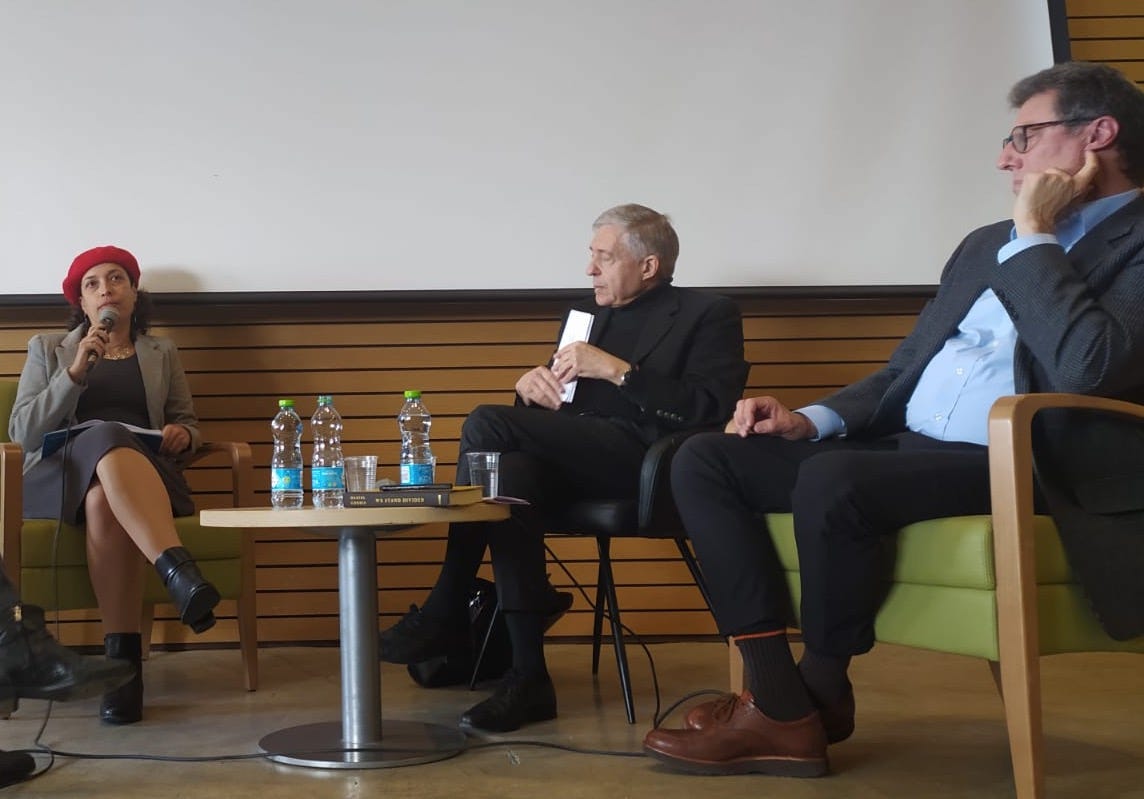

Discover more from Israel from the Inside with Daniel Gordis
And now for the contrary view
Critiques from a reader who though I was completely wrong about Ukrainian refugees
Those who have spent any real time studying Talmud know that when two rabbis disagree, they are often asked how they would respond to the strongest elements of the arguments that oppose them. To paraphrase slightly how the Talmud would do it, the question is, “we know what you think, but what do you think is the strongest part of the argument disagreeing with you, and how would you respond to that?”
That classic Talmudic trope—taking opposing arguments seriously—is sorely lacking in our world, in social and political discourse in general, in Jewish discourse more particularly, and with Israel-related conversations especially. With Israel from the Inside, we’re trying to do something different—to use the Thursday podcast, especially, to afford a platform to many different views, even competing ones, because Israel is a mosaic of ideas and opinions. To have a finger on the pulse of Israel, we need to hear many of those voices.
Today we’re going to apply that to the Ukrainian refugee issue. In response to my previous column on the subject, I got, among others, a response from someone I know who is very thoughtful, exceedingly bright and accomplished, and a deeply caring human being. He lives in Israel. He thought I was wrong on many counts and told me so in no uncertain terms, so I reached out to him and asked for his permission to share (anonymously) his email to me.
He consented, so here it is. [In a few places, I’ll add explanations with a DG: to explain his point where it might be necessary.] Though many of his points are well taken, I’ll follow his note (in good Talmudic fashion) with a few comments on why I still disagree. I won’t respond to each of his comments in detail, but instead, will give a sense why, despite his thoughtful comments, I think Israel made a serious mistake.
Hi Daniel,
I always read your posts with great interest -- and usually in broad agreement. You are generally thorough and fair-minded. The same cannot be said of today's post, which manages to ignore almost every salient fact that is relevant to the situation. Here are a few:
1. The number of Ukrainians, not including those eligible for citizenship under the Law of Return, who have sought to stay here *prior* to any hint of a war already numbered in the many tens of thousands (through family reunification, political asylum, or coming as tourists and not leaving). Under current circumstances, it will likely be well above 100,000 and not symbolic numbers as you suggest. We might not be the Amalfi coast, but apparently we're a reasonably attractive alternative, especially for people who speak Russian and/or Ukrainian.
2. Those who are eligible under the Law of Return are not all Jews. Over 70% of them are in fact not Jews. (In any case, if they're being held up by bureaucracy, that is indeed a crying shame.)
[DG: the Law of Return allows you to become an Israeli citizen as long as any one of your four grandparents is/was Jewish. But that does not make you Jewish according to traditional Jewish law. There are those who wish to amend the amendment to the Law of Return and have it apply only to those whose have a Jewish maternal grandmother, in which case 100% of those eligible would be halakhically Jewish.]
3. We aren't talking about people actually in harm's way, but rather those who have already received asylum in neighboring countries. They are in no danger of being deported or being overtaken by advancing forces.
4. We also aren't talking about temporary asylum; we are talking about coming and staying. Let us not be naive. Neither the press nor kind-hearted pundits, and especially not the courts, will abide a single refugee being sent back home once hostilities cease.
5. Avigdor Lieberman might not be a bleeding-heart liberal, but the one position (seriously, the absolutely only one) he has consistently maintained is that he wants as many non-Jews from the former USSR to come and stay in Israel. This is his base.
[DG: Lieberman came from Russia and his political base is largely the Russian community. Presumably, an influx of Russian-speakers might strengthen his base, whether or not they are Jewish.]
6. Shaked might or might not be in favor of annexing parts of Area C, but she is certainly not in favor of annexing the parts that include a significant number of Arabs. (That one was pure demagoguery.)
(And an un-numbered bonus point. If you must tie Amalek to current events -- not a recommended practice -- I can't help but mention that in the Eastern European refugee community in which I grew up, one of the most frequently heard sentences (right after "you're not eating anything" and "you never call") was "the Ukrainians were worse than the Nazis". Take that for what it's worth.)
Granted, even after taking all these points into account, one might still think that Israel ought to be taking in more refugees, but distorting or ignoring these facts for rhetorical effect does little to improve the already sub-optimal level of discourse in Israel.
Warm regards,
Before addressing a couple of my interlocutor’s points, I think it’s worth noting what an extraordinary thing it is that Israel has become a desirable destination even for people who are not Jewish and not particularly tied to Israel’s raison d'être. That wasn’t the case in the 1950’s when we had food rationing here, not in the 60’s or 70’s which were decades of wars, or the 80’s with a collapsing economy and runaway inflation.
The mere fact that we’re an attractive option is itself an enormous accomplishment, one actually worth celebrating, at least in our own minds.
As to my friend’s responses, #4 is, it seems to me, the strongest point. It’s actually incontestable. I was going to raise it in the previous column, but it was getting too long. Whoever we let in is going to stay as long as they want. We won’t be able to get them out. The press will make a stink, the international community would object and many American Jews would be appalled. So, I can’t disagree with #4.
I’ll limit myself to two points only, even though all the comments above merit discussion.
First, there are a lot of numbers between 5,000 and 100,000. Israel could say it will admit 25,000 non-Jewish refugees, or 30,000 or 50,000. We know how to close our borders when we need to. If it’s true that 100,000 is too many, pick a lower number. But make it high enough to show that we’re doing the right thing. Especially with our necessary obfuscation on Putin, let’s show that we’re strongly with the West when it comes to human beings.
Second, in addition to what I wrote in the previous column about what we are signaling to young Israelis, imagine what we could have signaled to American Jews if we’d done this right. Imagine the images of non-Jewish Ukrainians who wanted to come being welcomed, because we, too, know what it is like to have nowhere to go. If they stay, imagine us teaching them Hebrew. Maybe their kids might go to the army. could there be better spokespeople for Israel?
Imagine the pride we might instill in millions of American Jews. Would they all be moved? Of course not. One can already hear some of the younger progressives saying we’re “Ukrainian-washing.” They’re lost to us, but many others are not.
Here was an opportunity to show we’re not only about conflict, not only about rejecting their form of Judaism, not only about being coy when criticizing Putin—about which Natan Sharansky wrote in the Wall Street Journal, entirely correctly, that “Obama’s fecklessness in Syria and the Iran deal forced Jerusalem to choose survival over its principles.” Here was a chance, with the world rethinking about nation-states once again, to show what ours could do.
Former MK Yossi Beilin (among many other accomplishments, one of the architects of Birthright), former MK Tehila Friedman and I were on a panel yesterday at the University of Haifa as part of a conference on American Jews and Israel. The three of us disagreed about some things, but on one matter, we were all in accord: Israel missed a huge opportunity here. Beilin said that the politicians on both the left and the right that he’s spoken to don’t understand how or why Israel bungled this.
Would it have been simple? No. Would there have been risks? Yes. Were they manageable? I think so. Was there an opportunity to make a critical point about what Israel can be? I still believe so.
But it’s not a slam dunk, and some exceedingly bright, committed and knowledgable people disagreed with me. Israel from the Inside’s goal of fostering genuine conversation meant, I still believe, giving expression to these competing views.
With prayers for peace.
The Nazis’ Use of Purim — and Rosh Hashanah and Passover and more — in their attacks on the Jewish spirit
A conversation with David Bernstein
If you haven’t read Dara Horn’s most recent book, People Love Dead Jews, you should. It’s beyond powerful and exceptionally beautifully written.
With Purim a day away, here’s a quote from her book (page 12):
Gradowksi tells us how he escorted the thousands of women and young children into the disrobing room, marveling at how “these same women who now pulsed with life would lie in dirt and filth, their pure bodies smeared with human excrement.” He describes how the mothers kiss their children’s limbs, how sisters clutch each other, how one woman asks him “Say, brother, how long does it take to die? It is easy or hard?” Once the women are naked, Gradowksi and his fellow prisoners escort them through a gauntlet of SS officers who gathered for this special occasion- a night gassing arranged intentionally on the eve of Purim, the biblical festival celebrating the Jews’ narrow escape from a planned genocide.
The Nazis’ use of Jewish holidays to torment not just the bodies, but the minds, hearts and souls of the Jews, needs to be better known. They used Purim, but also Rosh Hashanah, Passover and more … all in ways that showed a diabolical understanding of the Jewish calendar, enabling them to use Jewish tradition to torture their Jewish victims' souls even before they destroyed their bodies.
To teach us more about this horrifying phenomenon on the eve of Purim, we spoke with David Bernstein, Dean Emeritus of the Pardes Institute in Jerusalem, and one of the most thoughtful and engaging guides to Jewish Poland around. Here’s an excerpt from our conversation. The full podcast will follow, as always, on Thursday, for paid subscribers to Israel from the Inside.
Our twitter feed is here; feel free to join there, too.














